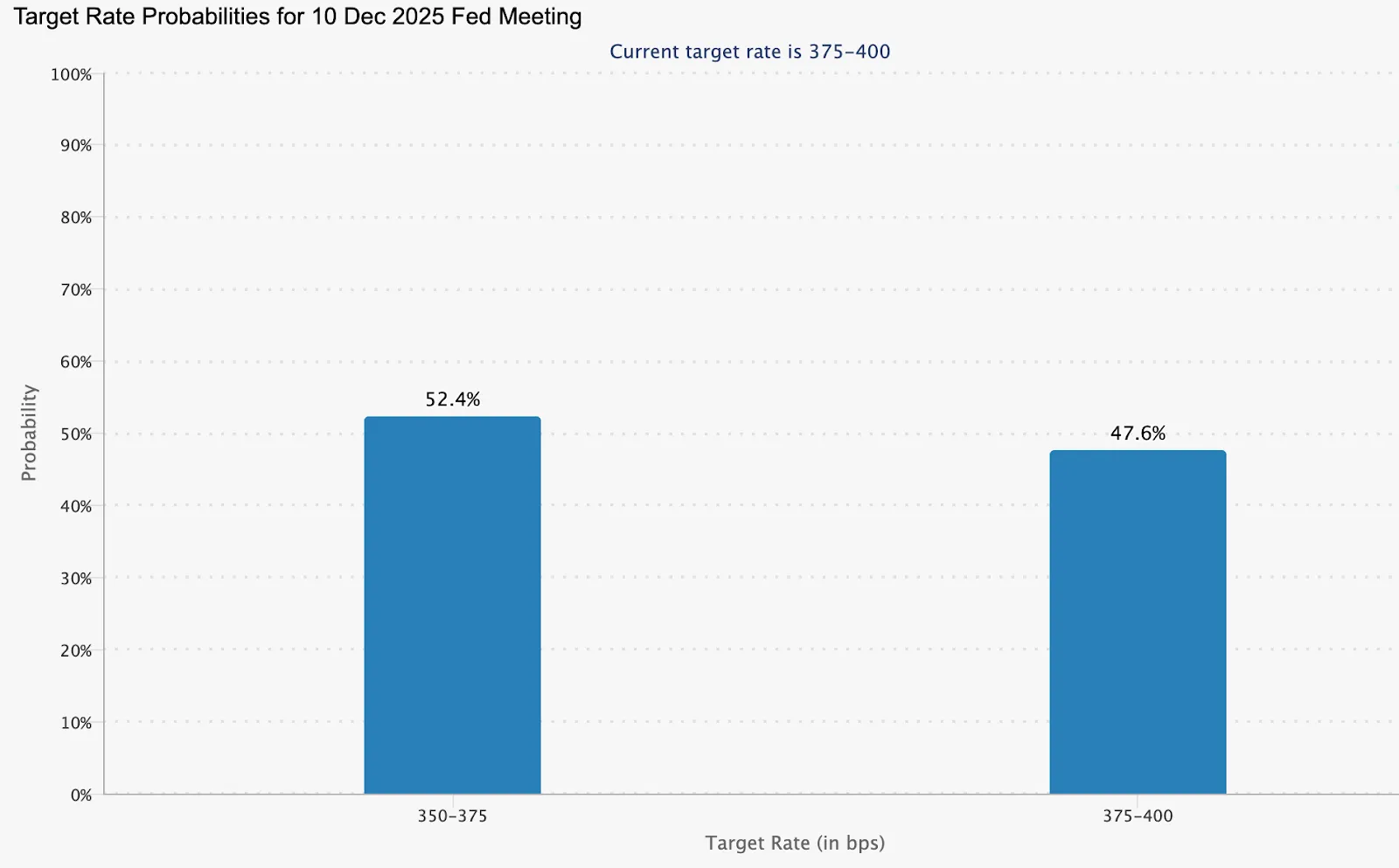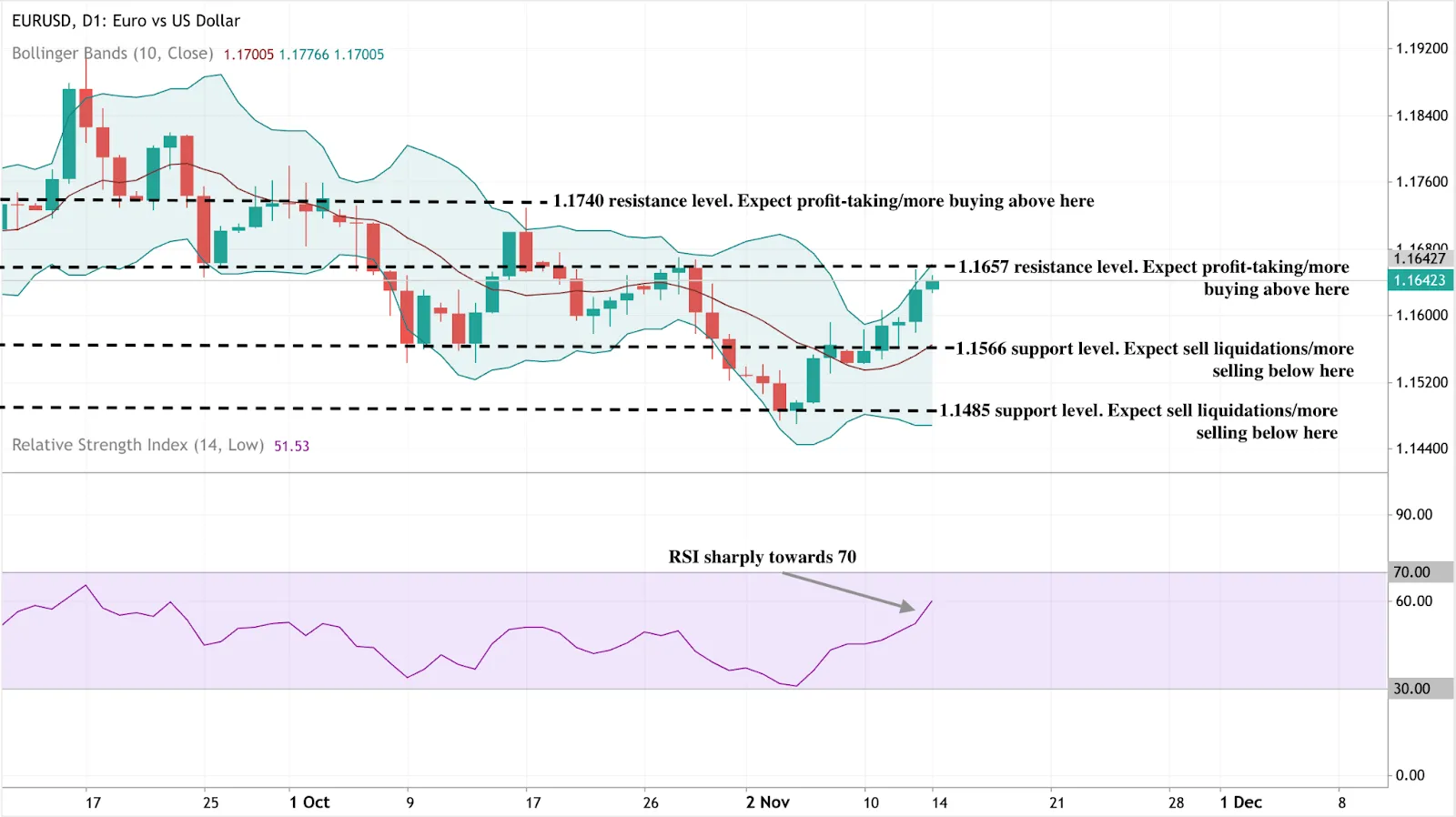EUR/USD outlook ahead of inflation and labour data
EUR/USD outlook ahead of inflation and labour data
EUR/USD outlook ahead of inflation and labour data

EUR/USD continues to trade within a narrow range as markets await long-delayed U.S. inflation data. The pair has hovered between 1.156 and 1.166, reflecting indecision among traders who are reluctant to take major positions until the next Consumer Price Index (CPI) release provides clarity on the Federal Reserve’s policy direction.
With inflation data still pending, volatility has faded. The euro remains steady against a broadly weaker dollar as traders weigh slowing U.S. growth, changing rate expectations, and a cautiously optimistic global risk mood.
Key takeaways
- EUR/USD trades near 1.1640, consolidating within a tight 1.156–1.166 band as investors await CPI data.
- U.S. data disruptions caused by the government shutdown have left policymakers and traders without clear direction.
- Policy convergence between the Fed and ECB continues as the U.S. edges closer to cuts while the Eurozone holds firm.
- Improving sentiment and declining energy risks in Europe support the euro’s underlying stability.
- Low volatility suggests the pair could see a sharp move once new data revives market conviction.
Market stall as US inflation and labour data delays persist
The recent U.S. government shutdown has left an unusual gap in market visibility. With the Bureau of Labor Statistics (BLS) still catching up, key reports - including October CPI and Non-Farm Payrolls (NFP) - remain delayed, leaving traders flying blind.
This lack of data is forcing both the Federal Reserve and the market to rely on speculation rather than evidence. According to the CME FedWatch Tool, traders currently price a 52.4% chance of a 25-basis-point rate cut in December - a probability that could shift dramatically once fresh inflation data emerges.

At the same time, risk sentiment is improving, while European markets remain firm, suggesting investors are cautiously optimistic. As risk appetite rises, the dollar typically loses momentum, giving the euro a mild lift through passive flows and reduced safe-haven demand.
EUR/USD investment implications: Momentum meets resistance
The balance between U.S. and Eurozone growth continues to narrow. According to the IMF, U.S. GDP growth is expected to slow from 2.8% in 2024 to 2.0% in 2025, while the Eurozone is forecast to improve slightly from 0.9% to 1.2%. This gradual convergence erodes the dollar’s long-standing growth premium.
Monetary policy is following a similar path. The European Central Bank (ECB) appears to have concluded its easing cycle, while the Federal Reserve is leaning towards a slower pace of tightening - or even cuts - as economic data softens. This narrowing policy gap has historically supported EUR/USD.
The Eurozone’s resilience is also helping the euro hold its ground. Falling energy costs, stabilising consumer sentiment, and calmer political dynamics are turning stability itself into a competitive advantage. In contrast, the U.S. is wrestling with delayed data, shifting inflation trends, and policy uncertainty.
CPI data impact: The market’s biggest blind spot
The missing U.S. CPI data is now shaping market psychology as much as it’s withholding it. Inflation remains the defining input for the Fed’s next move, and the lack of fresh figures has created a standstill in positioning.
A stronger-than-expected CPI reading could reignite rate-hike speculation and strengthen the dollar. Conversely, a softer print would reinforce the dovish narrative and likely push EUR/USD above its resistance zone.
For now, traders are responding to sentiment rather than fundamentals. That’s compressed volatility - but also built up potential energy for a sharp, directional move once data returns.
EURUSD technical insights: momentum meets resistance
At the time of writing, EUR/USD trades near 1.1642, leaning bullish but facing a cluster of resistance. The Bollinger Bands show price action testing the upper band, reflecting strong buying pressure and narrowing volatility.
However, with the pair approaching 1.1657, consolidation or short-term profit-taking may occur before any further advance. A breakout above 1.1740 would confirm bullish momentum and could accelerate gains towards the 1.18 zone.
On the downside, immediate support lies near 1.1566, with deeper support at 1.1485. A drop below these levels could trigger stop-loss liquidations and invite renewed dollar demand. Meanwhile, the Relative Strength Index (RSI) is edging closer to 70, signalling potential overbought conditions and the possibility of a temporary pullback before the next leg higher.
Traders using Deriv MT5 can track these developments with precision. The platform’s advanced charting tools, custom indicators, and real-time analytics make it easier to monitor momentum shifts and spot potential breakouts around key technical levels.

How to trade EUR/USD volatility on Deriv platforms
Periods of low volatility often precede major market moves - and Deriv MT5 gives traders the ability to prepare effectively.
- Advanced charting and analytics: Traders can monitor multiple time frames, overlay technical indicators such as Bollinger Bands and RSI, and set custom price alerts to react quickly once CPI data is released.
- Real-time execution and tight spreads: The platform offers direct access to forex markets with accurate pricing and low latency, enabling traders to respond efficiently when volatility spikes.
- Smart risk control: Before entering any position, traders can use the Deriv Trading Calculator to estimate margin requirements, pip values, and potential profit or loss - ensuring every position is sized appropriately relative to market risk.
Together, Deriv MT5 and the Deriv trading calculator provide the analytical precision and risk management discipline needed to trade EUR/USD volatility with confidence once the market wakes up from its data-driven pause.
EUR/USD investment implications
For short-term traders, EUR/USD remains a waiting game - a range defined by hesitation. While range-trading between 1.156–1.166 is possible, tight risk controls are critical given the potential for a breakout when CPI data lands.
Longer-term investors, however, may see opportunity in the euro’s improving fundamentals. With U.S. growth slowing and European data stabilising, the pair could gradually move towards 1.18–1.20 if dollar softness persists through 2025.
As always, preparation matters. Traders can use Deriv MT5 to stay alert to sudden momentum shifts and apply the Deriv Trading Calculator to plan their exposure. When inflation data finally arrives, those equipped with the right tools will have the clearest view of where the next EUR/USD trend begins.
The performance figures quoted are not a guarantee of future performance.















